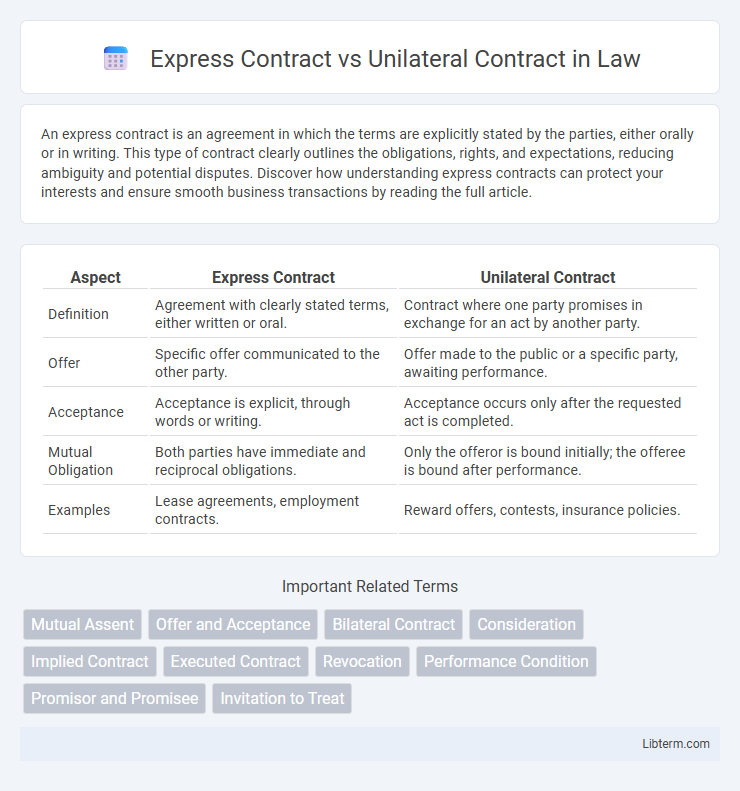An express contract is an agreement in which the terms are explicitly stated by the parties, either orally or in writing. This type of contract clearly outlines the obligations, rights, and expectations, reducing ambiguity and potential disputes. Discover how understanding express contracts can protect your interests and ensure smooth business transactions by reading the full article.
Table of Comparison
| Aspect | Express Contract | Unilateral Contract |
|---|---|---|
| Definition | Agreement with clearly stated terms, either written or oral. | Contract where one party promises in exchange for an act by another party. |
| Offer | Specific offer communicated to the other party. | Offer made to the public or a specific party, awaiting performance. |
| Acceptance | Acceptance is explicit, through words or writing. | Acceptance occurs only after the requested act is completed. |
| Mutual Obligation | Both parties have immediate and reciprocal obligations. | Only the offeror is bound initially; the offeree is bound after performance. |
| Examples | Lease agreements, employment contracts. | Reward offers, contests, insurance policies. |
Understanding Express Contracts
Express contracts are agreements in which the terms are explicitly stated by the parties, either orally or in writing, ensuring clear mutual understanding and intent to be bound. These contracts specify obligations and rights directly, facilitating enforceability and reducing ambiguity compared to implied contracts. Understanding express contracts involves recognizing the importance of clear communication and explicit consent in forming legally binding agreements.
Defining Unilateral Contracts
A unilateral contract is a legally binding agreement in which one party promises something in return for the other party's performance of a specific act, without requiring a reciprocal promise. Unlike express contracts that involve mutual promises explicitly stated by both parties, unilateral contracts are formed only when the requested act is completed. This type of contract is commonly seen in reward offers, where acceptance occurs through action rather than words.
Key Elements of an Express Contract
An express contract is characterized by clearly stated terms and mutual agreement between parties, either written or spoken, specifying obligations and rights explicitly. Key elements include offer, acceptance, consideration, mutual intent, and certainty of terms, ensuring both parties understand and consent to their commitments. This contrasts with a unilateral contract, which involves one party making a promise in exchange for the other's performance without immediate mutual agreement.
Essential Features of a Unilateral Contract
A unilateral contract is characterized by a promise made by one party in exchange for the performance of an act by another party, where acceptance is completed through the performance of the requested act. Essential features include the offeror's clear and definite promise, the offeree's act rather than a promise as acceptance, and the contract becoming binding only upon full performance of the requested action. Unlike express contracts, which involve mutual promises exchanged upfront, unilateral contracts rely solely on the execution of the act specified in the offer.
Major Differences Between Express and Unilateral Contracts
Express contracts explicitly state the terms and obligations of all parties involved, ensuring clear mutual consent and enforceability, whereas unilateral contracts involve one party promising an act in exchange for the other party's performance without a prior agreement. In express contracts, both parties make definite promises upfront, while unilateral contracts require only one party's promise, contingent upon the completion of a specified act by the other. The primary distinction lies in the nature of acceptance: express contracts demand explicit agreement, whereas unilateral contracts are accepted through performance.
Legal Enforceability: Express vs Unilateral
An express contract is legally enforceable because the terms are clearly stated and agreed upon by both parties, either orally or in writing, creating mutual obligations. A unilateral contract is enforceable when the offeree performs the requested act, thereby accepting the offer implicitly and binding the offeror to fulfill their promise. Courts uphold express contracts based on explicit promises, while unilateral contracts rely on actual performance as evidence of acceptance.
Examples of Express Contracts
Examples of express contracts include signed employment agreements, written leases, and service contracts outlining specific terms between parties. These contracts explicitly state the obligations and promises, such as a contractor agreeing to build a house for a fixed price or a buyer purchasing goods under specified conditions. Clear communication and written documentation characterize express contracts, contrasting with unilateral contracts where only one party makes a promise.
Examples of Unilateral Contracts
Unilateral contracts involve one party making a promise in exchange for the other party's performance, such as a reward offer for finding a lost pet or completing a task. An example includes a company promising a bonus to any employee who achieves a specific sales target, where the contract is formed only when the task is completed. Another common instance is a homeowner offering payment for the return of stolen property, creating a binding contract once someone performs the requested act.
Advantages and Disadvantages of Each Contract Type
Express contracts provide clear terms and mutual assent, reducing ambiguities and simplifying enforcement, but they may require formal negotiation and documentation, which can be time-consuming. Unilateral contracts offer flexibility, allowing one party to promise a reward in exchange for performance without initial mutual obligation, yet they create uncertainty as contract formation depends on the performance occurring. The express contract's clarity benefits legal certainty, while unilateral contracts may result in wasted resources if the offer is not accepted through performance.
Choosing the Right Contract for Your Needs
Choosing the right contract depends on the clarity of mutual obligations and the nature of the agreement; express contracts explicitly state terms agreed upon by all parties, ensuring clear communication and enforceability. In contrast, unilateral contracts involve one party promising something in exchange for an act by another, suitable when only one party's commitment is essential until the other fulfills the requested performance. Understanding your specific transaction goals and the level of certainty needed helps determine whether an express or unilateral contract best protects your interests and aligns with legal requirements.
Express Contract Infographic

 libterm.com
libterm.com